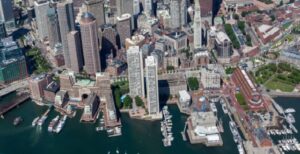A judge’s ruling in a high-stakes dispute over proposed new zoning will keep a pair of major Boston waterfront developments on the drawing boards rather than closer to groundbreaking.
Suffolk Superior Court Associate Justice Brian Davis allowed two lawsuits to proceed that seek to block the new municipal harbor plan (MHP), which would pave the way for a pair of new towers on the Harbor Garage and Hook Lobster properties.
“The [plaintiffs] plausibly have alleged that approval of the downtown MHP violates various provisions of environmental laws,” Davis wrote in a ruling issued Thursday.
The Conservation Law Foundation and the trustees of the Harbor Towers II condos are challenging the new zoning framework, arguing it violates state laws limiting the size of waterfront development to preserve public access.
In 2018, then-Secretary of Environmental Affairs Matthew Beaton approved a new downtown waterfront harbor plan following a multi-year study by the Boston Planning and Development Agency.
The new zoning framework would apply to 42 acres of waterfront parcels including The Chiofaro Cos.’ 1.3-acre Harbor Garage property, where the Boston-based developer has sought to build a 600-foot-tall, mixed-use tower replacing the 8-story parking garage on East India Row. And the owners of the James Hook & Co. lobster pound have floated plans for a residential tower on their Atlantic Avenue site.
The municipal harbor plan would allow taller and denser development in the area between the Hook property and Christopher Columbus Park than previously allowed under Chapter 91, the state’s Public Waterfront Act. Currently, the maximum building height on the Harbor Garage property is 155 feet.
“The downtown MHP approved by the secretary, however, establishes a considerably greater 600-foot height limitation for the garage property, which, coincidentally or otherwise, happens to correspond to the height of the proposed [Chiofaro] project,” Davis wrote in his ruling.
In exchange for more density, developers are required to provide public benefits, such as an agreement by Chiofaro Co. to contribute $10 million toward a new “Blueway” promenade connecting the Rose Fitzgerald Kennedy Greenway to the waterfront, and upgrades to Long Wharf ferry facilities.
CLF argued that Beaton exceeded his authority and that the harbor plan violates state regulations that “buildings for nonwater-dependent use will be relatively modest in size.” In his ruling, Davis said it is plausible that the 600-foot height limit violates the regulations.
In a statement issued Friday in the wake of the ruling, CLF said the harbor planning process “arbitrarily abandoned” requirements that waterfront buildings step down in height.
“It is unacceptable that this plan allows developers to buy their way out of regulations they don’t like,” Peter Shelley, CLF senior counsel, said in a statement. “The public’s right to access the waterfront has been guaranteed for generations, and officials have single-handedly undermined that right. ”
The state Executive Office of Energy and Environmental Affairs did not immediately respond to a request for comment.




 |
| 



